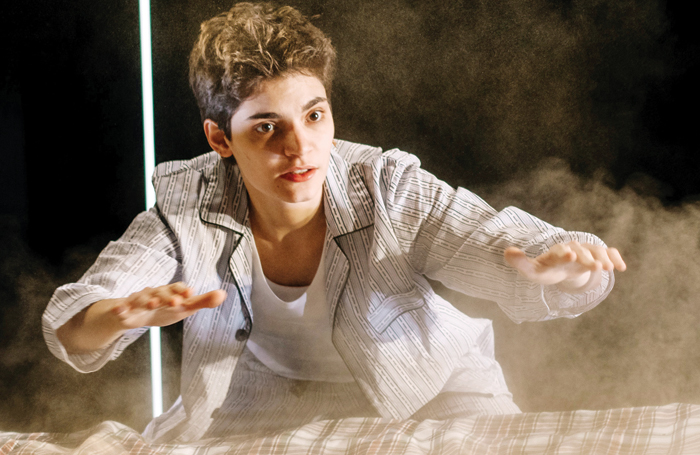The Metamorphosis, co-produced by Vanishing Point, Tron Theatre and Emilia Romagna Teatro Fondazione is sleek and stylish from the very beginning, making up for the somewhat stretched and overwrought narrative. Plunging the audience into darkness, before dual strips of neon white lights snap on, the intensity of the alienation and surrealism perfectly sets the atmosphere for the play.
Based on Franz Kafka‘s work about a man who is transformed into an insect, the story is adapted on stage to revolve around a man, Gregor, who works for an aggressively motivated and unrelenting delivery service to repay his secretive, bickering and vain father’s debts.
The dialogue in the opening scenes is punctuated with quips about the service industry and the dehumanisation and commodification of an overstretched and underappreciated workforce. Sick days are blasphemy and employment is the only acceptable form of validation in this uncanny theatrical world. This is a timely and interesting message, although it quickly loses impact and is instead replaced by an uncomfortable sense of unintentional repetition and stalling, making the play seem drawn out and ineffective in its use of time.
This repetitive hammering of the message is offset by the interesting choice of having Gregor transform in such a unique and confusing way, being rendered invisible and replaced with an entirely new person. This helps to add some nuance and levelling to the plot; it’s an innovative way of telling the story and adds a new dimension of otherness.
The acting is consistently brilliant, adding layers of conflicting emotion. The multi-faceted performances lend humour and tragedy that outwit the main story of the play. Vanity and despair are portrayed with finesse and the characters feel unnervingly real in their struggles. Nico Guerzoni embodies the transformation of Gregor and brings a poignancy and bittersweet innocence to the role of Gregor’s new insectile form, conjuring disgust and sympathy at once in an utterly convincing and heart-wrenching performance.
The silent, physical theatre portions of the play are some of the finest moments, ramping tension and discomfort at a skilled pace and going further than simply telling the story. They elegantly and subtly get under the skin to expose the grotesque weakness and unadaptability of humanity.
The highlight of the show, though, is the staging. The use of a misty screen to separate Gregor from his family -allowing the audience to see the strained family interact through an obscuring, distancing but transparent veil – is inspired. Similarly, the screen allows for moments of pure strangeness, including heads floating away from bodies, adding another layer of comic, beautiful surrealism. Visually, the play is constantly surprising and keeps the viewer anticipating and dreading the next odd turn.
This staging of The Metamorphosis almost says too much. It is beautiful, challenging and confronting; however it seems to fall over itself in its attempts to lay down a message through the overwrought dialogue. It weakens the narrative that is otherwise skilfully conveyed through the physicality of the actors and the transformation of the set. Overall, this is an important and thoroughly unnerving retelling of a very relevant story, which seems belligerently intent on getting its message across.
